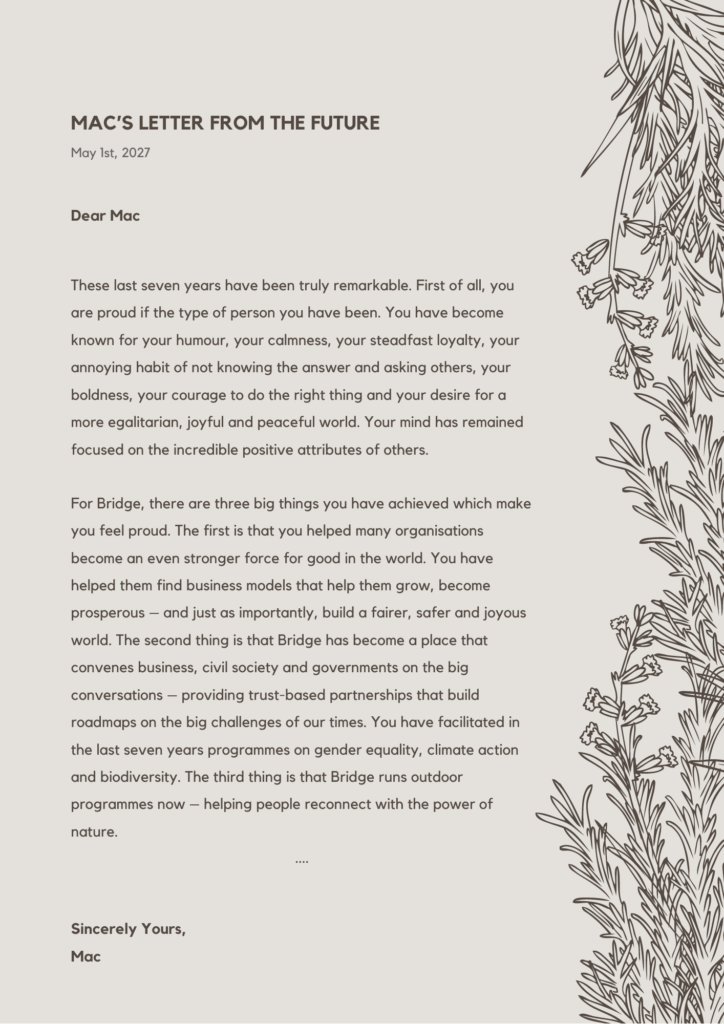How a crisis can reshape your leadership
That old adage of never letting a crisis go to waste seems extremely pertinent right now. This moment in time feels unprecedented in its level of disruption. Many of us have never experienced anything like this before and are probably hoping we never have to again. But through disruption and chaos come many possibilities and seeds of opportunity. All of us will be at different stages of managing the crisis in our organisations. Some may still be at the acute stage, the early stage where you are acting quickly and putting out fires. Once you move to the adapt phase, it’s essential to do just that, to understand how to adapt as a leader and as an organisation. At this stage, there is an opportunity to unlock a very different future for ourselves and our organisation. Within the chaos, we have an opening to reinvent ourselves – to become a societal leader.
The decisions we make now will have a profound effect on how we are seen by others and what we want to stand for. How we treat our employees, our customers and the wider society will live on long after COVID-19 has ended. Chaos can sometimes make us see things far more clearly. Disruption to our daily lives, to our usual patterns of behaviour enables us to re-evaluate, to cut through the noise and to truly understand what really matters to us. We start to see things differently; we allow new opinions in; we ask questions we didn’t ask before or didn’t want to ask.
Has there been a moment during this pandemic where you have reflected on your life choices, personal or professional or both, and questioned why you were doing something? If yes, and if some of those reflections involved a desire – even a longing – to lead for something more meaningful in your organisation, beyond just profit, and wanting to have a more positive impact on the world, these are the beginnings of societal leadership. A societal leader is someone who is motivated by the greater good of others.
If you have been having these thoughts, now is your moment to embrace them with both arms and start to nurture these green shoots of societal leadership.
Exploring how to become a societal leader
How can you develop the practices and capabilities to lead for something that matters to you and that has a positive impact on the wider society? We will be sharing some steps you can take to support you on the path to societal leadership. As food for thought, first let us explore some of the common beliefs of societal leaders.

Beliefs of prominent societal leaders
Societal leaders often have a similar set of beliefs. We will explore three key beliefs. We’ve identified six common beliefs. Feel free to read our more detailed article on these.
Belief in partnership:
One of the most common beliefs of a societal leader is their belief in the power of partnership, that by treating one another as equals and working together, we can find much more effective solutions. Many of the crises we are up against today are global challenges. They affect us all and go beyond our organisation. It therefore makes sense that these challenges require a collective response and solution. As organisations, we cannot solve these on our own.
Unilever’s Lifebuoy story is an example of partnering with others to solve global challenges. Lifebuoy is a soap brand under the Unilever umbrella. Every year, 2.1 million children die from deadly yet preventable diseases like diarrhoea. Under Paul Polman’s vision, the Lifebuoy team defined their purpose as: “Help a child reach 5.” They partnered with schools, hospitals, governments and civil society to drive awareness of the importance of clean hands. This resulted in a significant shift in behaviour in the regions in which Lifebuoy were active. Lifebuoy credited Polman for helping them see their higher purpose and recognising the power of partnership.
Opening ourselves up to partnering with others – whether that be governments, NGOs, researchers, scientists, establishments in our community, or others – enables us to collectively solve societal challenges as well own organisational challenges.
Belief in truth:
“Devotion to this Truth is the sole justification for our existence. All our activities should be centred in Truth.” — Gandhi.
Societal leaders such as Ghandi see truth as the substance of all morality. Without truth, they believe, it would be impossible to navigate principles and the rules of life. He once shared a story about truth.
Being led by the truth enables a more principled approach to leadership. What do we mean by being led by the truth? We mean suspending judgement and preconceptions and looking at the present reality, no matter how uncomfortable it might be, in order to uncover the real challenges and issues. We mean being guided by the insights that you discover and leading from that place. Seeking the truth – by raising your level of awareness, noticing things, being present in the moment – takes practise and energy. But it ultimately results in a far more united approach by the team, especially when they are committed to this practice.
Being led by the truth requires you have the courage to act on what you find. We say ‘courage’ because this may mean challenging the current narrative or belief system within your organisation.
Belief in wider responsibility:
Societal leaders understand that we are responsible for more than ourselves and that we have the opportunity to influence far more than we may realise. Take a moment to consider all you could potentially positively impact – your colleagues, your organisation, your customers, your suppliers, your community, the wider society and future generations.
Several organisations are rethinking their purpose and what they want to stand for. This in part has been driven by consumer demands. Expectations of organisations from consumers and employees are profoundly shifting due to concerns about the health of our planet and our people as well as demands for a fairer and more inclusive society. Organisations are becoming far more conscientious in their decision-making.
It is important to note that profit does not need to be sacrificed in order to shift an organisation’s purpose to one that focuses on benefitting society. In fact, quite the opposite. We believe that when an organisation finds its sweet spot – where societal needs, consumer needs and an organisation’s capabilities all intersect – they will find their purpose, one that is not only beneficial to the world but also commercially advantageous. Consider your organisation’s purpose and whether there may be commercial, environmental and societal advantages in rethinking it.

What capabilities can you develop in order to become a societal leader?
We have explored some of the common beliefs of societal leaders. Hopefully this has given you some provocation to explore what you believe in. Now let’s deep dive into the capabilities that you can nurture in order to become a societal leader. We will focus on four key capabilities. If you are interested in exploring additional capabilities, there are twelve capacities we’ve identified that societal leaders develop during their lives.
Resourcefulness:
“One of the most difficult things is not to change society – but to change yourself.” —Nelson Mendela
It takes energy and resilience to influence an organisation or society. We are much more effective in doing so when we are fully resourced and in the right frame of mind. But, as we all know, it is easy for triggers from the external world (even everyday triggers such as something someone said or an email) to knock us off balance sometimes. Which is why this journey – of affecting change in our organisation – cannot begin without us first understanding how to master our own mindset and rebalance ourselves when we get knocked off course. At the heart of resourcefulness is the awareness that when we are not at our best, it is in our own hands and we can choose to change it.
When we are at our best – when we feel confident and resourceful, powerful and inspired – we are at our most effective. We can speak with clarity and we can motivate others. We can think clearly and see the wood from the trees. We find the right words of encouragement or the discerning critique that makes a difference to others.
However, most of us are not at our best all of the time. We often find ourselves overwhelmed, feeling stressed, hung up on details, or so focused on outcomes that we lose sight of the big picture. When we are not resourceful, our relationships, our thinking, ideas and creativity are poorer.
To a large extent, our state is the vital ingredient of our ability to think, innovate, relate and lead. Resourcefulness is thus about knowing how to choose our state or attitude, no matter what is happening in the world around us. Explore our practical guide to find exercises and practices that will enable you to resource and rebalance yourself.
Courage:
When we care deeply about something, it unleashes within us immense courage. This in turn inspires us to put aside any self-limiting thoughts and dare to step forward. Societal leadership, and indeed leadership as a whole, is about having the courage to activate change, no matter how difficult this may be. Change sometimes begins with having great quality conversations with others, exploring similarities and differences and forging a new path. Here is some advice about how to facilitate great quality conversations.
Taking people with you:
“When one feels seen and appreciated in their own essence, one is instantly empowered.” — Wes Angelozzi
It is an almost instinctive response for many leaders to assume that in order to support others (for example, their team and their colleagues), they need to direct them and share their views from the get-go. Telling someone what to do, however, rarely inspires. Influencing by telling, does not instil inner motivation in others and is usually short lived.
Societal leaders understand that people are at their best when they are seen and heard, when they feel safe to freely express their views, when their contributions are valued. We can empower others by showing them that they are understood and appreciated. It is of course still very important for leaders to share their own views and vision, but it is far more effective for them to do so once they have first heard and reflected on everyone else’s. For more tips on how to influence others, explore our See Hear Speak practice.
Systems Thinking:
Global challenges like climate change, food insecurity, healthcare and social inequality each come with a myriad of stakeholders, and are part of complex human, ecological and evolving systems. Progress therefore requires a departure from traditional, hierarchical and linear approaches, and an adoption of strategies that engage a broad network of stakeholders with complex and interconnected dynamics. This approach is known as systems thinking.
Systems thinkers are able to bring different stakeholders together to create a systemic transformation. To bring about meaningful change, it is important to go way beyond a normal sphere of exploration and think about the whole ecosystem. If, for example, you are a food producer, this would involve looking at the whole chain: how is your organisation impacting the communities in which you have factories, the growers and pickers of your ingredients, the working conditions in retail stores where you sell etc.

Taking action
We’ve explored some of the capabilities of societal leaders, which will hopefully help you identify some skill sets and mindsets you can develop. Now let’s focus on some activities aspiring societal leaders can undertake to start their journey.
Disrupt yourself
Many prominent societal leaders in history have experienced injustices in the world and have had an intense desire to do something about it. They have often lived through extreme circumstances, which have in turn disrupted the way they see the world and how they fit in it.
Your circumstances don’t have to be nearly as extreme. What we can take from these examples, however, is the importance of educating ourselves on issues that we are passionate about. Don’t just hear about problems but go out and experience them. Talk to people who have been affected, visit places that have been impacted – this will disrupt your thinking and your being. If you work in retail, this could be as simple as going onto the shop floor to understand what people are experiencing. If you’re concerned about climate change, connect with people who have lost livelihoods, homes and loved ones due to natural disasters. If you’re passionate about creating a healthier society, talk to people who live chronic health conditions. The possibilities are endless. Essentially what we are saying is, step into the boxing ring of life and open yourself up to unlikely collisions.
Technology makes this much easier in today’s world; you can connect with people living entirely different lives to yours. Be comfortable and committed to encountering the unknown and not sitting on the sidelines.
Deeply connect to and find your purpose
As Friedrich Nietzsche said, “He who has a why to live for can bear with almost any how.” The personal vision of societal leaders is what inspires and guides them every day.
Many of us have never sat down and explored our purpose. When we don’t, we may carry on with externally determined goals, sometimes with an increasing sense of dissatisfaction. At some point we may ask ourselves, is this all there is? Without a clear sense of purpose, we may at times find ourselves feeling lost. Purpose can act as a North Star, something that guides us and also helps us lead.
To discover your purpose, we recommend writing A Letter from the Future. This note—from your future self to your present self—is a way to envision and reflect on what has taken place over the last, say, seven years from today.
The Letter should address these questions:
What type of person have you been? How did people experience you? What is the world you want to create for future generations? What were your greatest achievements towards this? What have been your biggest contributions to the world? How did you experience the last seven years? What brought you the most joy? What impact did you make on those close to you? How are you developing yourself to become a societal leader?
Not only will writing a Letter from the Future take your mind off the grind of day-to-day life; it will also help you tap into your higher purpose. When penning this note, dream big and “swing for the fences”. “Swinging for the fences”, a phrase used in baseball, means putting all you can into hitting the ball as far as possible. You know that your bat might miss the ball entirely, but if you succeeded in making contact, the rewards would be significant.
So settle yourself down in a relaxing place, get your pen and notepad ready, and swing for the fences.
Here is an example of one of our letters:

Mentor and be mentored:
Societal leaders create a community of inquiry, where they can stop, reflect, make sense and move forward. They have mentors and become great mentors to others. In your own journey, attain mentors, or become one for others.
To find mentors, start by identifying three people you know and consider to be wise and gifted—individuals from different walks of life who you think are the best examples of societal leaders. Ask them to be your mentors: this can be in the form of a 30-minute conversation once a month, for instance. At the same time, find three other people you can be a mentor to; people who might benefit from your skills or experiences.
Understand which areas you can develop
To map where you’re at in terms of purpose, beliefs and capacities, we have put together a short diagnostic click here for the short survey. Upon completion, look at the areas you’ve scored lower on and think about what’s holding you back. Note these down and act upon them.
Activating your personal agency does not mean you have to give up your day job. Indeed, corporations can play a major role in building a more just and sustainable future. Like government bodies, nonprofits and social enterprises, for-profit organisations, too, can make impactful contributions.
The journey begins with you
The path towards becoming a societal leader is open to everyone, including you. How you start it is up to you. Get the ball rolling with a project. It could be a business project, a family one or something to do with your community. Whatever your undertaking, it has to resonate deeply with you—it might be something that you scored 10 out of 10 for in our diagnostic test. Then, kick things off with a small pilot and dedicate five per cent of your time to it per day.
There’s no better time to act than the present. If you still find yourself doubting that you have the right or capability to change the world, consider the words of American author Marianne Williamson:
“Our deepest fear is not that we are inadequate. Our deepest fear is that we are powerful beyond measure. It is our light not our darkness that most frightens us. We ask ourselves, who am I to be brilliant, gorgeous, talented and fabulous? Actually, who are you not to be?”
If you are interested in exploring any of these areas in more depth, feel free to get in touch with us.
Leading for something more: how to become a societal leader
by Simon McKenzie and Jane Sassienie

